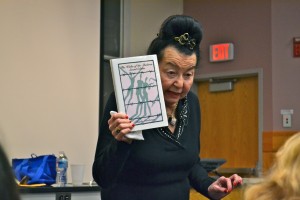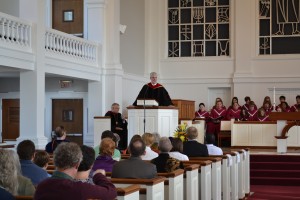Alpha Xi Delta is one of the founding members of the founding fraternities of the National Panhellenic Conference, boasts over 150,000 initiated members and plans to establish its next chapter at the University. Alpha Xi hosted an information session for interested women on campus on Nov. 27 from 5 to 7 p.m. in the Gallery Theatre. A full fraternity-coordinated colonization effort will take place in spring of 2013, which will be followed by a five-year period of care to ensure the new chapter’s success. We sat down with Assistant Director of Sorority Affairs Kevin Pons to discuss how this sorority will fit into campus life.
What does this new sorority have to offer over other sororities that we could have invited to colonize on campus?
“We are confident that Alpha Xi Delta is the best choice for Bucknell and we look forward to welcoming them to campus in the spring. Alpha Xi Delta was selected from seven National Panhellenic organizations that applied to colonize at Bucknell. An extension committee comprised of staff and students selected AZD for many reasons. Some of these reasons include diversity of their national philanthropy (Autism Speaks), strong support from area alumnae, strong support from the national headquarters, campus presentation and interviews and more.”
Why did we decide to bring another sorority on campus?
“Bucknell University Panhellenic decided to open for extension last year. The goal of extension is to increase the opportunity for interested women to become affiliated and to slightly decrease the average sorority chapter size. Our goal over time is to have our sororities closer to 100 members, as opposed to the average of 135 we are seeing now. In doing so, we will be able to create stronger organizations and maximize the opportunity for students to assume leadership positions.”
How will this affect Rush next year?
“Alpha Xi Delta will be recruiting women this spring to join their colony. The plan is to have the chapter fully chartered by the end of the academic year. Alpha Xi Delta will participate in formal recruitment with our other six NPC groups next fall, ultimately increasing the opportunity for women to join our thriving Panhellenic community.”
Do we plan on adding any other sororities in the near future?
“In addition to Alpha Xi Delta, we have invited Delta Zeta to re-colonize no sooner than the spring of 2015. Delta Zeta previously had a chapter at Bucknell and continues to have a strong alumnae group committed to the success of the new colony in the near future. This agreement will be revisited closer to 2015 to ensure it is still mutually beneficial.”


